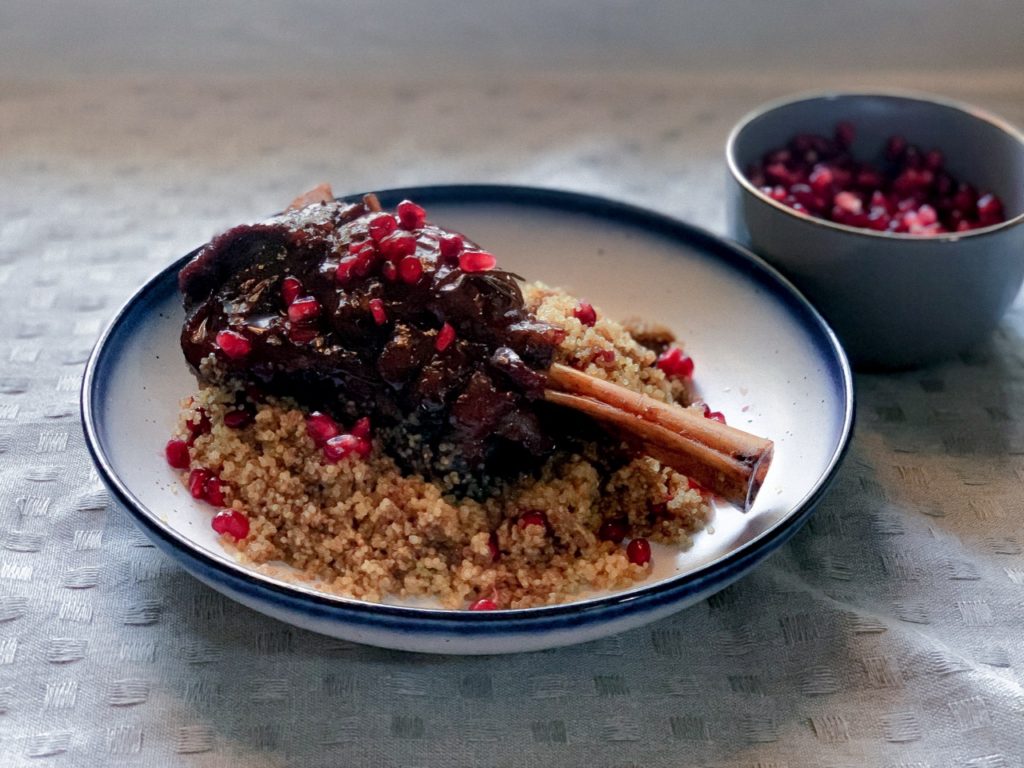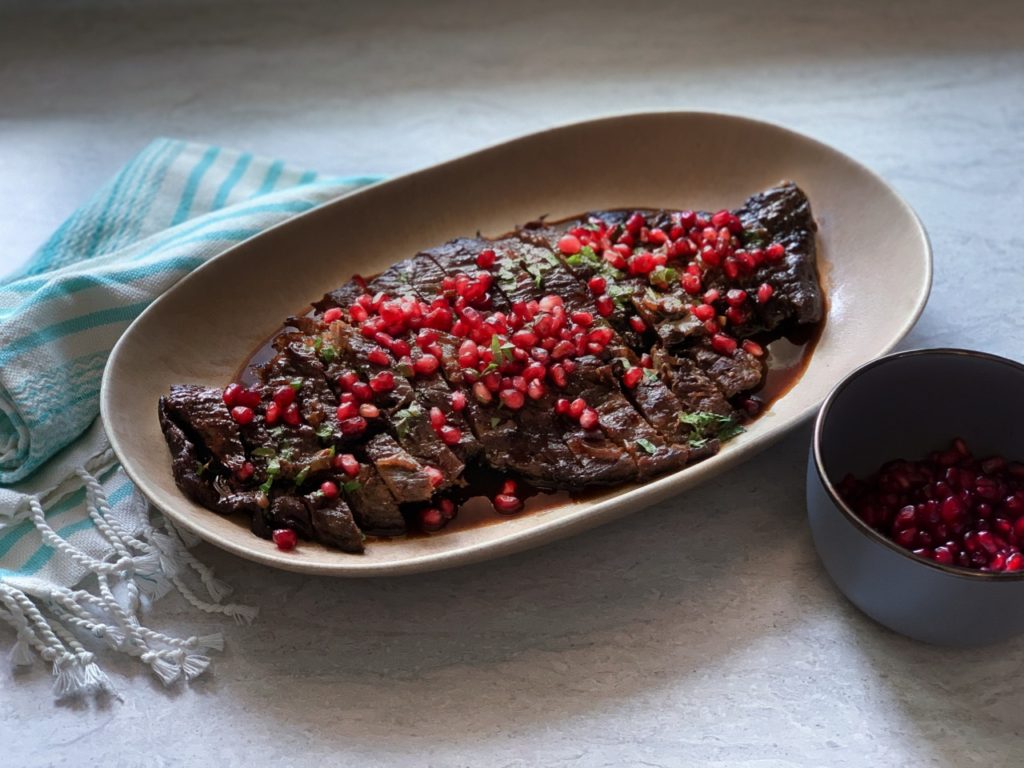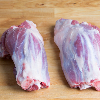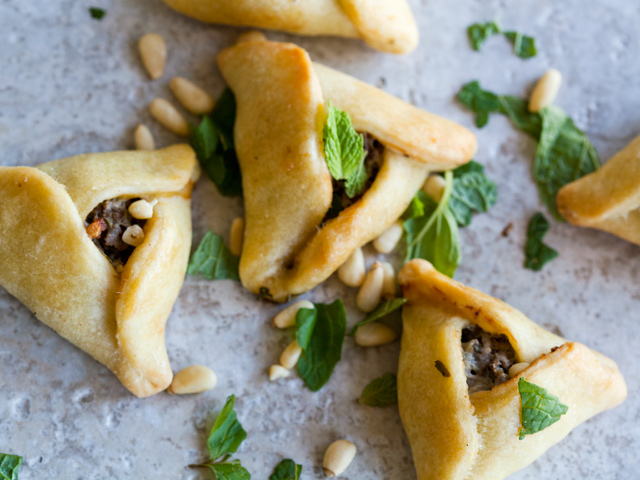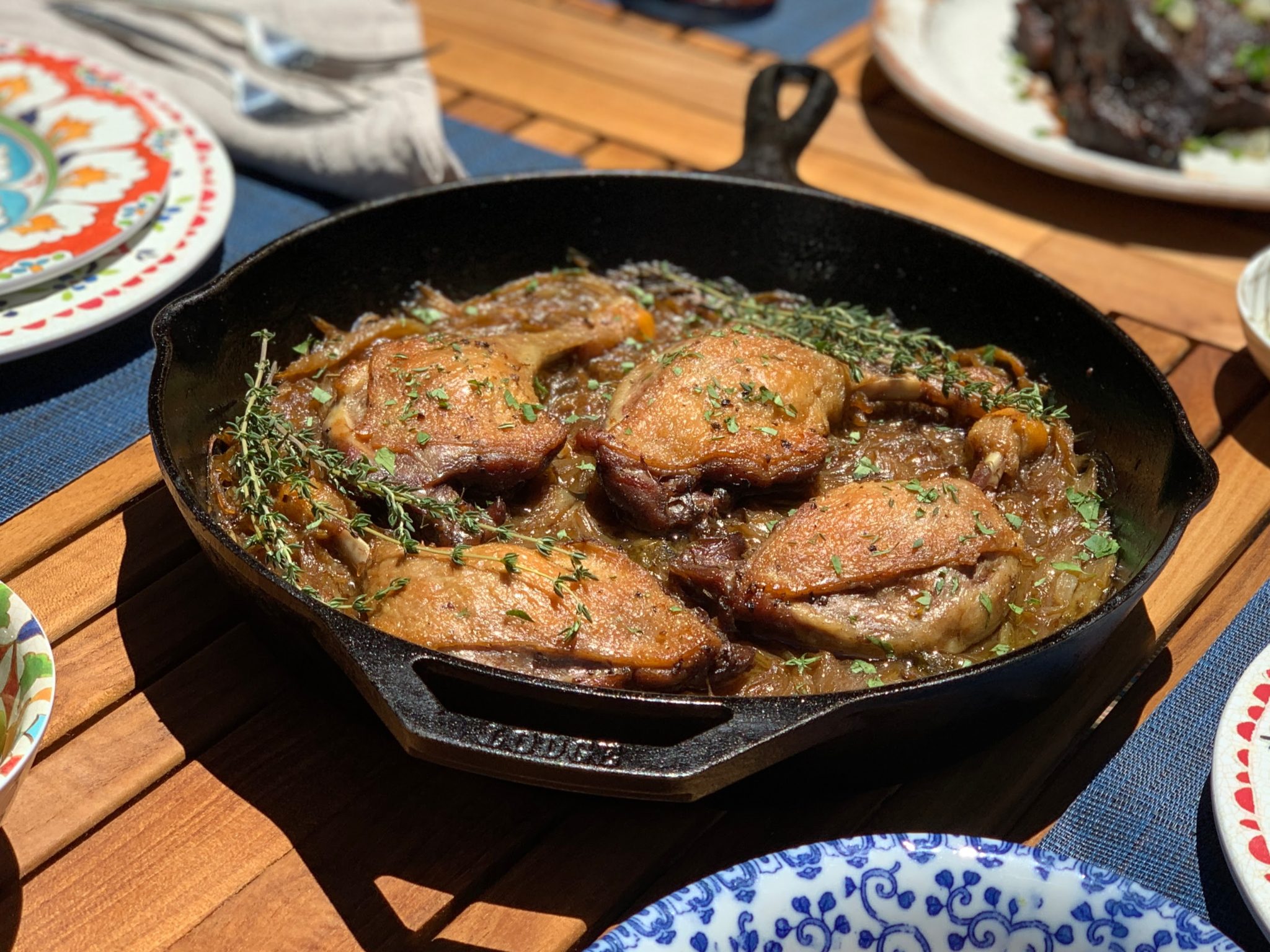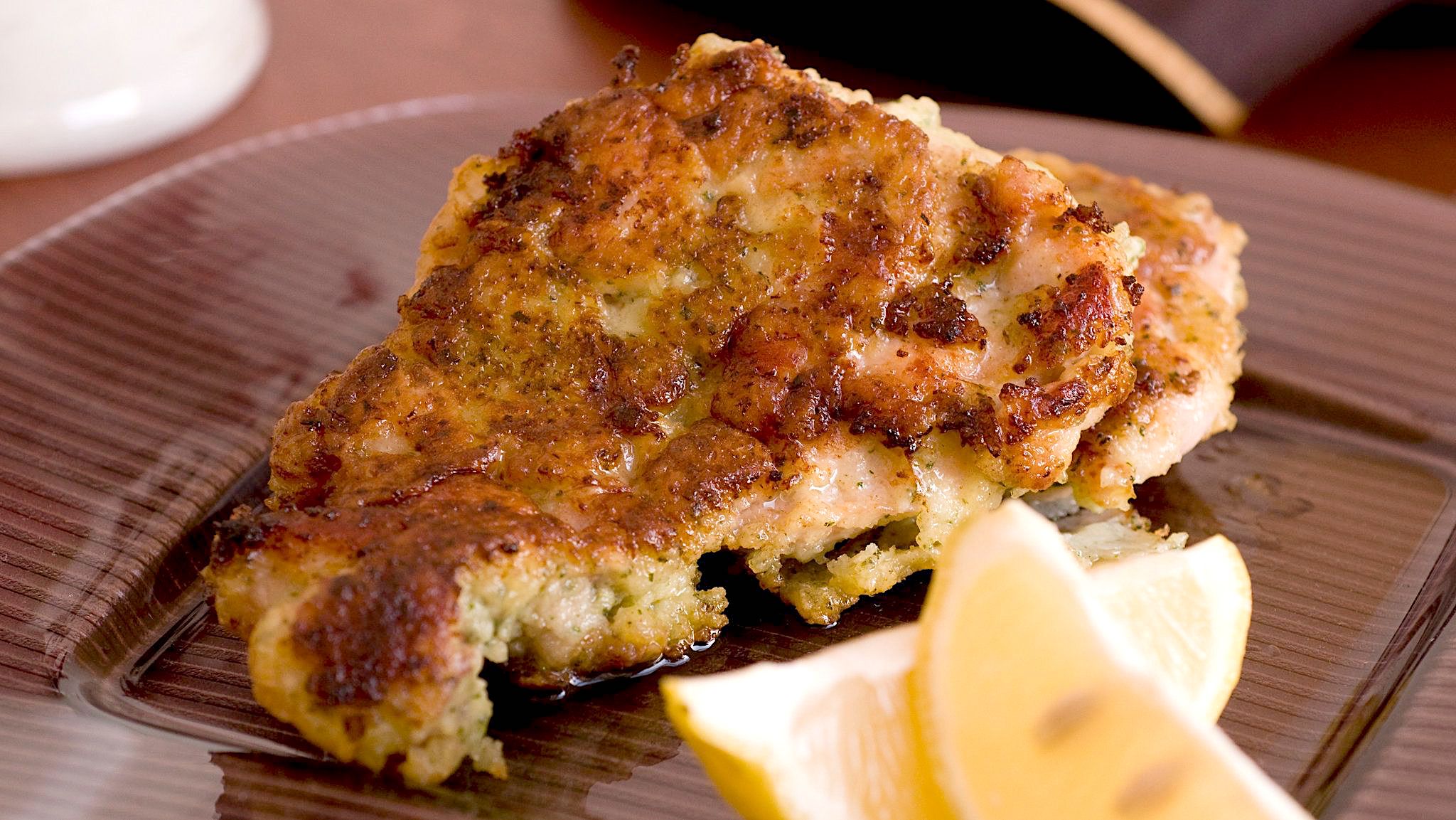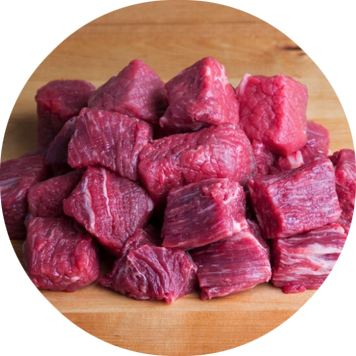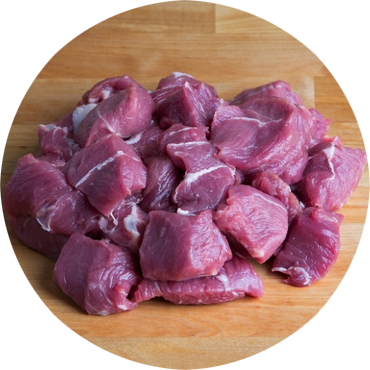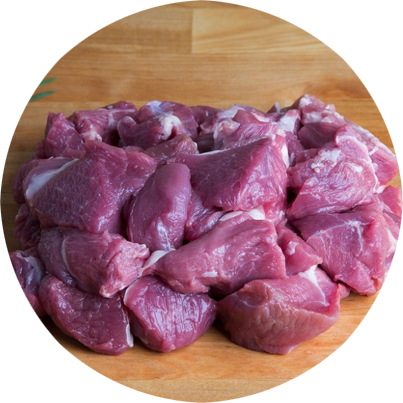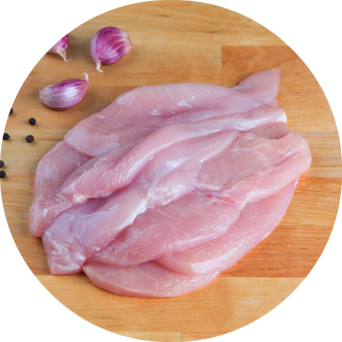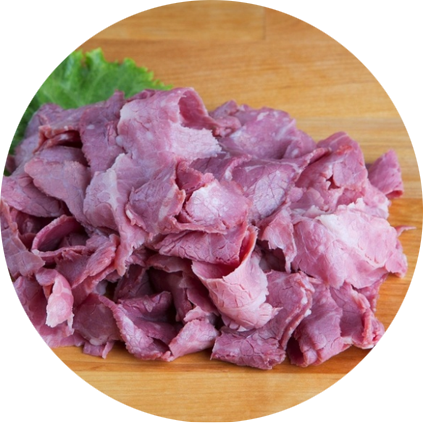- 4 lb braising roast (see note below)
- Salt to taste
- 1/4 cup canola, peanut, or vegetable oil
- 1 sweet onion, sliced
- 2 cups pomegranate juice
- 1/3 cup balsamic vinegar
- 4 large garlic cloves, crushed with the back of a knife
- 3 to 4 sprigs fresh rosemary
- 2 teaspoons honey
- 1/2 teaspoon chile flakes
- Freshly ground black pepper
- Pomegranate seeds for garnish (optional)
Note: This recipe is for 4lbs of lamb shanks or braising beef roast. For a larger roast, use 2 onions and increase liquid so that at least half of the roast is submerged (if cooking Deckel or Kalakel, use enough to completely cover the roast). You can adjust the quantities of vinegar, honey, chile and pepper according to your taste. A smaller roast may not need all of the liquid, but that will depend on the size of your pot–more on this below.
You can use any braising beef or lamb roast with this recipe, including Lamb Shanks, all the briskets, Deckel, Top of the Rib, French Brisket, Chuck Pot Roast, Pastrami Roast and more. We have a couple pictures below for inspiration. Allow about 60 minutes per pound. Make sure the meat is tightly covered while braising, and check on it about halfway through your estimated cooking time, adding more liquid if necessary. Meat is done when it is easy to poke with a finger or a fork — if it springs back, it’s still tough and needs to cook longer. We strongly recommend cooking your roast the day before you plan to serve it — it will taste better the next day, and it takes the stress out of timing the cooking precisely.
You will need a thick, oven-safe casserole (such as a Dutch oven) to make this recipe. Ideally, your roast will fit in the pan with about 1-3″ of space around it; if it is very large, cut it in half and stack the pieces on top of each other. If it is quite small, see if you have a smaller pan; if not, you may need to add more liquid since the wider surface area of the bottom of the pan will lead to quicker evaporation of the liquid. Most importantly, you want a tight fitting lid to prevent evaporation over the long cook. If you’re using foil, make sure to seal it back up very well after you open it up to check on the meat.
Sear the meat
Preheat oven to 250° F, and position an oven rack in the middle. In a large, deep-sided, oven-safe pan (such as a Dutch oven), heat vegetable oil over medium-high heat. Season meat generously with salt, then brown them very well on all sides. Transfer meat to a plate and set aside.
Make the cooking liquid
Pour off all but about 1 tablespoon of the fat from the pan. Lower the heat under the pan to medium. Add onion and a pinch of salt and cook, stirring frequently, for about 5 minutes, or until the onion is starting to soften. Add pomegranate juice, scraping the bottom of the pan to release any browned bits. Add balsamic vinegar, garlic cloves, rosemary sprigs, and chile flakes, and bring the liquid to a boil.
Braise
Return the meat to the pan, along with any juices that have accumulated on the plate. Let the liquid come back to a boil, then cover the pan with a lid or aluminum foil. Bake for about 45-60 minutes per pound, until the meat is very tender. Remove the pan from the oven and let stand, covered, for 30 minutes. Turn the oven down to 150° F.
The exact cooking time will depend on the size of your roast, the size of the pan and your oven. We recommend you calculate the approximate cooking time and check it half way through, then every 30 minutes after that, taking care to ensure the pot is tightly covered after you check, and adding more liquid if too much has evaporated. Lamb Shanks and most roasts should be 1/3-1/2 submerged in liquid (more will accumulate during the cooking); Deckel and Kalakel should be fully or nearly-fully submerged.
Reduce liquid to make a sauce
Transfer the meat to a serving platter or a rimmed baking sheet, and cover with aluminum foil. Place in the oven to keep warm. Strain the braising liquid through a fine mesh strainer into a measuring cup or small bowl, and discard the solids. Let the liquid stand for a minute or two, so that the fat rises to the top. Use a ladle or spoon to skim off as much of the fat as you can—don’t worry about getting it all.
Pour the liquid into a small saucepan (or wipe out the pan you cooked the meat in, and use that). Place the pan over medium-high heat and bring the liquid to a boil. Add honey and black pepper, then let the liquid reduce for 5 to 10 minutes, or until it’s the consistency you like. Taste and add more salt, chile flakes, vinegar, and/or honey as needed.
To serve
Remove the meat from the oven and spoon over the reduced braising liquid. Scatter pomegranate seeds over them. Serve warm.
Make it ahead
We strongly encourage you to make your roast a day ahead (if more than that, put it in the freezer until the day before you plan to serve it). After taking it out of the oven, let the whole thing cool completely and refrigerate (you may want to take the roast out of the liquid and refrigerate it separately). The next day, scoop off as much of the solidified fat as you can, then reheat the meat in the braising liquid. It is much easier to slice braising roasts when they are cold, but take care to reheat them gently in a tightly covered pan so they don’t dry out.
Transfer the shanks to a platter or pan, put in a 150° F oven to keep warm, then strain and finish the sauce as instructed.
You can make this recipe with any beef or lamb braising roast. Here are a couple of cuts we love with this recipe:
